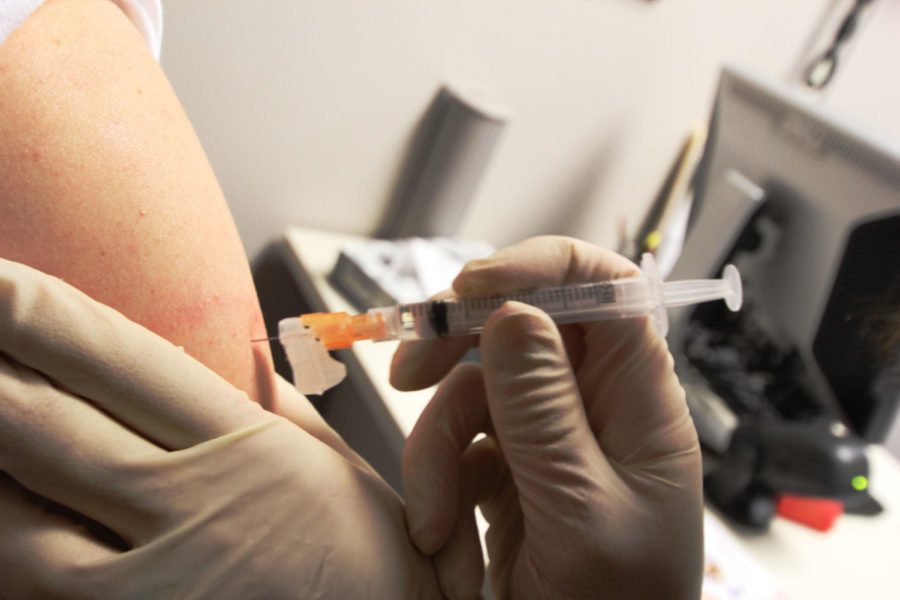Iowa State provides flu shots for employees
Photo: Jonathan Krueger/Iowa State Daily
This week, eligible Iowa State faculty and staff have the opportunity to receive free flu shots through ISU WellBeing and Occupational Medicine, who sponsor the flu shot clinic for the university.
October 14, 2019
ISU WellBeing, with assistance from Occupational Medicine, is sponsoring a flu shot clinic for university employees this month. The clinic will be open 9 a.m. to 4 p.m through Friday in room 205 of the Technical and Administrative Services Facility. Appointments may be required after Friday.
No appointment is needed throughout this week, and registration is paperless. Individuals can check in on a smart tablet with the nurse who administers the vaccine. Employees need to check in using their nine-digit university ID number. The vaccine is provided at no cost for Iowa State employees in these groups:
Faculty, professional and scientific and merit postdocs
ISU Foundation staff
Iowa State Daily benefits-eligible staff
Retirees on the Iowa State health plan who are not yet 65 years old
Only Iowa State employees are eligible to receive a flu shot; their spouses and children are not included in the eligibility. Iowa State students, both undergraduate and graduate, and visiting scholars should contact the Thielen Student Health Center for vaccination information.
Pregnant employees are able to get flu shots, though they are encouraged to check with their physician prior to vaccination.
If possible, employees are asked to wear a short-sleeve or loose-fitting shirt to give the person administering the vaccination easier access to the upper arm. Visitor parking is limited at the Technical and Administrative Services Facility, so walking or biking is recommended.
Employees who participate in the flu shot clinic will receive a four-component vaccine that protects against A and B flu virus strains. The four viruses the quadrivalent contains are:
A/Brisbane/02/2018 (H1N1) pdm09-like virus
A/Kansas/14/2017 (H3N2)-like virus
B/Colorado/06/2017-like virus
B/Phuket/3073/2013-like (Yamagata lineage) virus
Alternative forms of the vaccine prepared for the 2019-20 flu season will not be available at this clinic. These include a spray/mist vaccine administered through the nose and a high-dose vaccine intended for individuals 65 years and older who are at greater risk of severe illness from influenza. Employees or retirees who prefer one of these should contact their primary care physician.
Flu immunizations are covered on the Iowa State health plan, so employees can get the vaccine at their physician’s office. ISU Wellbeing encourages employees to use the worksite option if possible due to its convenience and because it is more cost effective for employees’ medical plans. Though spouses and dependents cannot receive the flu shot at the clinic, they are encouraged to get their vaccine through their physician’s office.
The CDC recommends that all persons aged six months or older receive an annual flu vaccination, with rare exceptions. Vaccination is particularly important for people who are at high risk for serious flu complications. Along with getting the flu vaccination, there are other preventative steps individuals can take to protect against the virus.
- Avoid close contact with people who are sick. When you are sick, keep your distance from others to protect them from getting sick too.
- If possible, stay home when you are sick. This will help prevent spreading your illness to others.
- Cover your mouth and nose with a tissue when coughing or sneezing.
- Wash your hands often to help protect yourself from germs. If soap and water are not available, use an alcohol-based hand rub.
- Avoid touching your eyes, nose or mouth. Germs are often spread when a person touches something that is contaminated with germs and then touches his or her eyes, nose or mouth.
- Practice other good health habits. Clean and disinfect frequently touched surfaces at home, work or school, especially when someone is ill. Get plenty of sleep, be physically active, manage your stress, drink plenty of fluids and eat nutritious foods.
















